Overview
Starting your own event planner business can feel overwhelming. You may be grappling with uncertainties about the industry dynamics, identifying your target audience, and developing the essential skills needed for success. We understand these challenges, and that’s why this article serves as a comprehensive guide. It explores:
- Market trends
- Competitor analysis
- Regulatory requirements
- The importance of networking
These elements can empower you to create a fulfilling and successful business venture. Remember, you are not alone in this journey, and with the right support, you can navigate these challenges effectively.
Introduction
In the vibrant and ever-evolving landscape of event planning, 2025 brings forth both challenges and opportunities for aspiring entrepreneurs like you. We understand that as the industry embraces sustainability and technological advancements, navigating market dynamics can feel overwhelming. Identifying emerging trends and honing vital skills are essential steps on your journey to launching a successful event planning business.
This article aims to explore the critical components of building your venture, emphasizing the importance of:
- Effective job descriptions
- Clear role definitions
- Innovative marketing strategies that resonate with today’s diverse audiences
By equipping yourself with the right knowledge and tools, you are not alone in navigating this competitive arena; together, we can create memorable experiences that leave a lasting impact.
Laying the Groundwork: Understanding the Event Planning Industry
Launching your planning business can feel daunting, but understanding the dynamics of the planning industry in 2025 can empower you. Begin your journey by exploring key areas that resonate with your aspirations:
- Market Trends: Are you aware of the emerging trends that can shape your success? Staying informed about sustainability and technology integration is essential. In 2025, a significant shift towards eco-friendly practices is evident, with 73% of planners noting that hybrid gatherings enhance the attendee experience. Furthermore, 52% of planners recognize increasing attendance as a challenge, underscoring the need for innovative strategies. The rise of artificial intelligence is crucial for fostering engagement, as highlighted in the case study titled “Future of Virtual Events,” showcasing how the industry is adapting to meet evolving expectations.
- Target Audience: Who do you envision as your potential clientele? Whether you’re planning corporate functions, weddings, or social gatherings, understanding your audience is key. This insight will allow you to tailor your services to meet their specific needs, creating meaningful connections.
- Competitor Analysis: Have you taken the time to examine existing event planner businesses in your area? Analyzing their service offerings, strengths, and weaknesses can provide valuable insights. This understanding will help you identify your unique selling proposition (USP) and set your venture apart in a crowded market.
- Regulatory Environment: Are you familiar with the necessary licenses and permits required to operate in your locality? Gaining a clear understanding of the regulatory environment will help you navigate potential legal complications as you establish your enterprise.
- Networking Opportunities: Are you ready to connect with others in your field? Prioritize attending industry gatherings and engaging with professional associations. Building a network can lead to beneficial collaborations and client recommendations, which are vital for expanding your business in the competitive occasion management industry. Remember, you are not alone in this journey; support is available, and taking these steps can lead you toward a fulfilling career ownership.
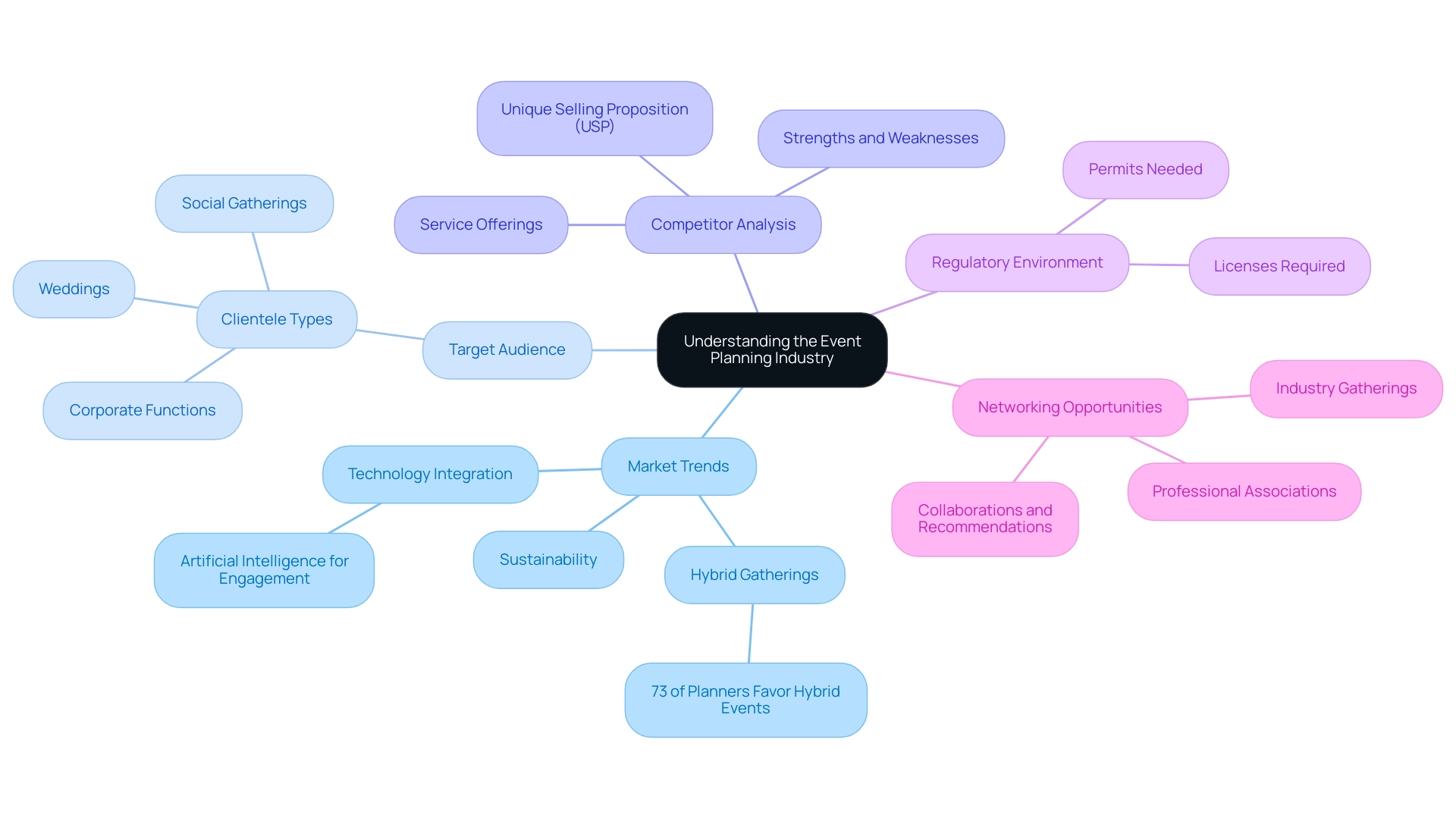
Key Skills and Qualifications for Aspiring Event Planners
To thrive in the event planning business, it’s essential to nurture a diverse skill set, particularly in an industry projected to reach a remarkable $53 billion in the online ticketing market. You may be wondering, what skills should I focus on in 2025? Let’s explore some essential abilities that can guide your journey.
-
Organizational Skills: Mastering organizational skills is not just beneficial; it’s imperative for effective planning. Consider utilizing project management software to manage tasks, timelines, and deliverables efficiently. This ensures that every detail is accounted for. With the rise of hybrid gatherings—where 82% of attendees prefer in-person experiences while still valuing virtual attendance—strong organizational skills will empower you to adapt to these evolving formats with confidence.
-
Communication Skills: Strong verbal and written communication abilities are vital for meaningful interactions with customers, vendors, and team members. Have you ever felt misunderstood? Practicing active listening is essential to fully grasp client needs and expectations, leading to greater satisfaction and successful execution. According to IBM, there is a shift in consumer behavior, with 3 out of 4 consumers wanting to be more sustainable in their daily lives. This makes clear communication about sustainable practices not just important, but essential.
-
Creativity: The heart of planning lies in crafting unforgettable experiences. Stay motivated by actively tracking industry trends and discovering innovative concepts. This will enable your creativity to shine through in each project you create, making each event special.
-
Budget Management: Proficiency in budget management is crucial. Cultivate the skill to formulate and manage budgets effectively. By employing financial software to monitor expenses and revenues, you can ensure that activities remain financially sustainable while fulfilling client expectations. Remember, it’s about balancing creativity with practicality.
-
Problem-Solving Skills: Events seldom unfold as planned, and that’s where strong problem-solving skills become invaluable. Think about a time when things didn’t go as expected. Refining your ability to think swiftly in the moment and create solutions to unforeseen challenges ensures that each occasion proceeds seamlessly, despite any hiccups along the way. For instance, utilizing AI-driven chatbots can greatly enhance attendee support by offering immediate replies and automating registration procedures, improving overall management efficiency.
-
Networking Skills: Building a robust network of relationships with vendors, venues, and clients is crucial for success. Have you considered attending industry networking gatherings? Engaging with professionals can broaden your connections and nurture collaborations that improve your organizing efforts. By concentrating on these key skills, you can position yourself for success in a changing industry that increasingly values adaptability and creativity. Remember, you are not alone on this journey; we’re here to support you every step of the way.
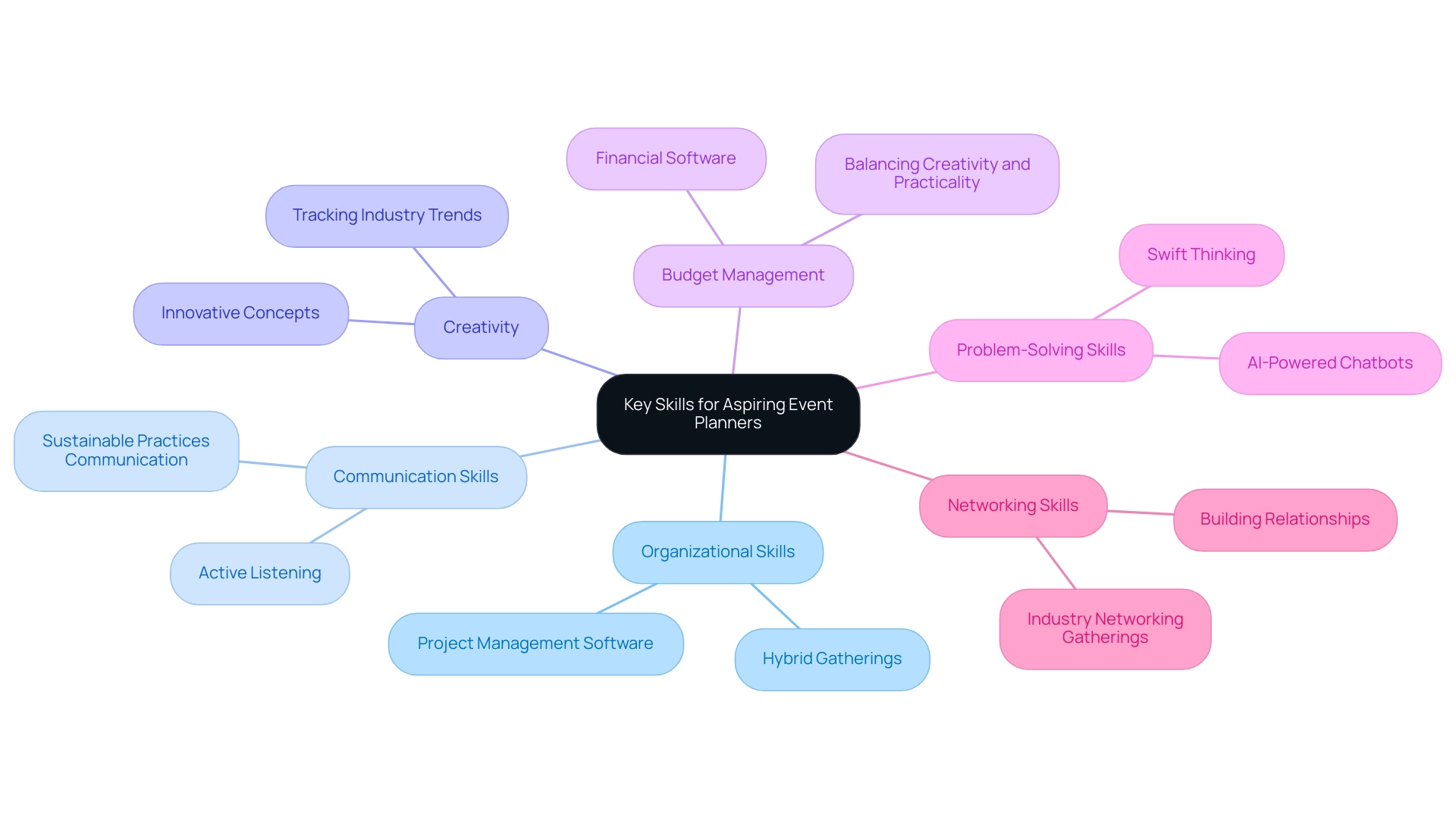
Crafting Effective Job Descriptions for Your Event Planning Team
As you embark on the journey to grow your planning business, creating effective job descriptions becomes vital in attracting the right talent. With a significant 85% of brands set to see a substantial rise in sales by merging live marketing campaigns with emerging technologies, the need for skilled planners is more pressing than ever. Here’s a step-by-step guide to help you craft job descriptions that truly resonate with potential candidates in 2025:
- Job Title: Begin with a clear and precise job title. Using industry-standard terminology ensures that prospective candidates grasp the role’s expectations and context.
- Job Summary: Offer a concise overview of the position, detailing its core purpose and how it aligns with your organization’s overall goals. This sets a welcoming tone for what the role entails.
- Responsibilities: Clearly outline the key duties associated with the position. Be specific about essential tasks such as managing vendor relationships, coordinating logistics, and overseeing the successful execution of activities. Clarity here can significantly influence candidate interest and suitability. Remember, 79% of leads from occasions vanish without follow-up, so it’s crucial to emphasize responsibilities that include implementing effective follow-up strategies.
- Qualifications: Clearly define the qualifications needed for the role, including educational background, relevant experience, and any necessary certifications. In the realm of organizing occasions, a degree in hospitality management or coordination is often favored.
- Skills: Highlight the critical skills required for success in the role. This includes communication proficiency, organizational capabilities, and adept problem-solving skills—attributes that are essential in the fast-paced industry of gatherings.
- Company Culture: Provide a brief insight into your company culture to attract candidates whose values align with your organization. A strong cultural fit can lead to higher employee satisfaction and retention.
- Application Process: Clearly outline the application process, including the required documents and deadlines. This clarity helps simplify candidate submissions and fosters a positive application experience.
As Parnell Woodard, a Career Ownership Coach, emphasizes, transitioning to a profession in coordinating gatherings can empower individuals to achieve their career aspirations. By applying these best practices, you will not only streamline your hiring process but also enhance the quality of applicants, ultimately supporting the success of your business.
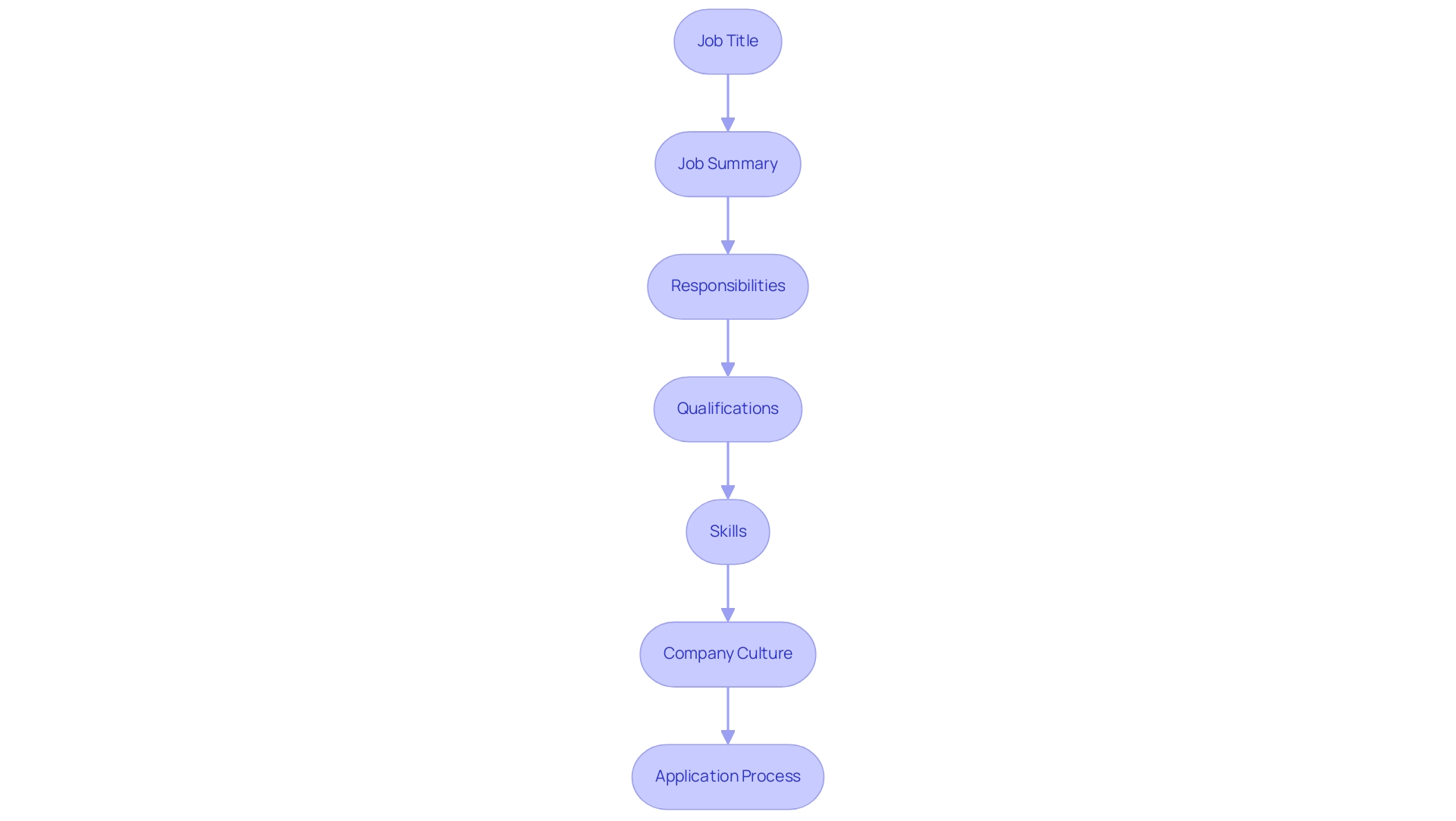
Defining Roles: Objectives and Responsibilities in Event Planning
To ensure your event planner business operates with maximum efficiency, it is crucial to define clear roles and responsibilities for each member of the gathering organization team. This clarity not only enhances collaboration but also nurtures a supportive environment for everyone involved. Here’s a breakdown of key positions that contribute to successful event execution in 2025:
- Event Coordinator: The cornerstone of the planning process, the Event Coordinator supervises all aspects of the occasion, collaborating with various team members to ensure smooth execution and alignment with the client’s vision. They are the guiding force, ensuring that every detail resonates with the client’s aspirations.
- Logistics Coordinator: This role is vital for managing logistical elements such as venue selection, catering, and transportation. The Logistics Coordinator ensures that all details are meticulously planned and executed, which is crucial in today’s fast-paced environment. Their efforts alleviate stress, allowing the team to focus on creating memorable experiences.
- Marketing Specialist: Responsible for promoting the occasion, the Marketing Specialist engages potential attendees through social media and other channels. This role is particularly important given that 61% of professionals in the field acknowledge the need for improved diversity in speaker lineups, which can significantly enhance the appeal and inclusivity of the gathering. They help ensure that every voice is heard and valued.
- Budget Analyst: Monitoring expenses and ensuring adherence to budget constraints, the Budget Analyst provides essential financial reports that assist the team in making informed decisions throughout the development process. As Jonathan Kaplan notes, “Average rates continue to rise due to higher labor, food, and other fixed costs, along with the impact of inflation – we believe that trend will continue with high demand.” This viewpoint emphasizes the significance of careful budget management in planning activities, ensuring that dreams remain achievable.
- Client Liaison: Serving as the primary contact for clients, the Client Liaison ensures that the client’s needs and expectations are met at every stage, fostering strong relationships that are critical for repeat business. They embody the heart of the operation, ensuring clients feel valued and understood.
- On-Site Coordinator: On the day of the occasion, the On-Site Coordinator takes charge, ensuring everything runs according to plan and swiftly addressing any issues that may arise, which is essential for maintaining a seamless experience. Their presence provides reassurance, allowing everyone to enjoy the moment.
- Post-Event Evaluator: This role entails collecting feedback and assessing the success of the gathering against defined objectives. Insights from the Post-Event Evaluator are invaluable for refining future gatherings and strategies, aligning with the evolving landscape where measurable outcomes are increasingly important. As highlighted in the case study “Closing Thoughts on Marketing,” the marketing landscape has transformed, emphasizing the balance between analytical tools and personal engagement strategies.
Defining these roles in the event planner business not only clarifies responsibilities but also enhances collaboration, allowing the entire team to work towards a common goal. Embracing this structured approach will yield better outcomes and foster human connections, which remain at the heart of successful gatherings. Remember, you are not alone in this journey; together, we can create extraordinary experiences.
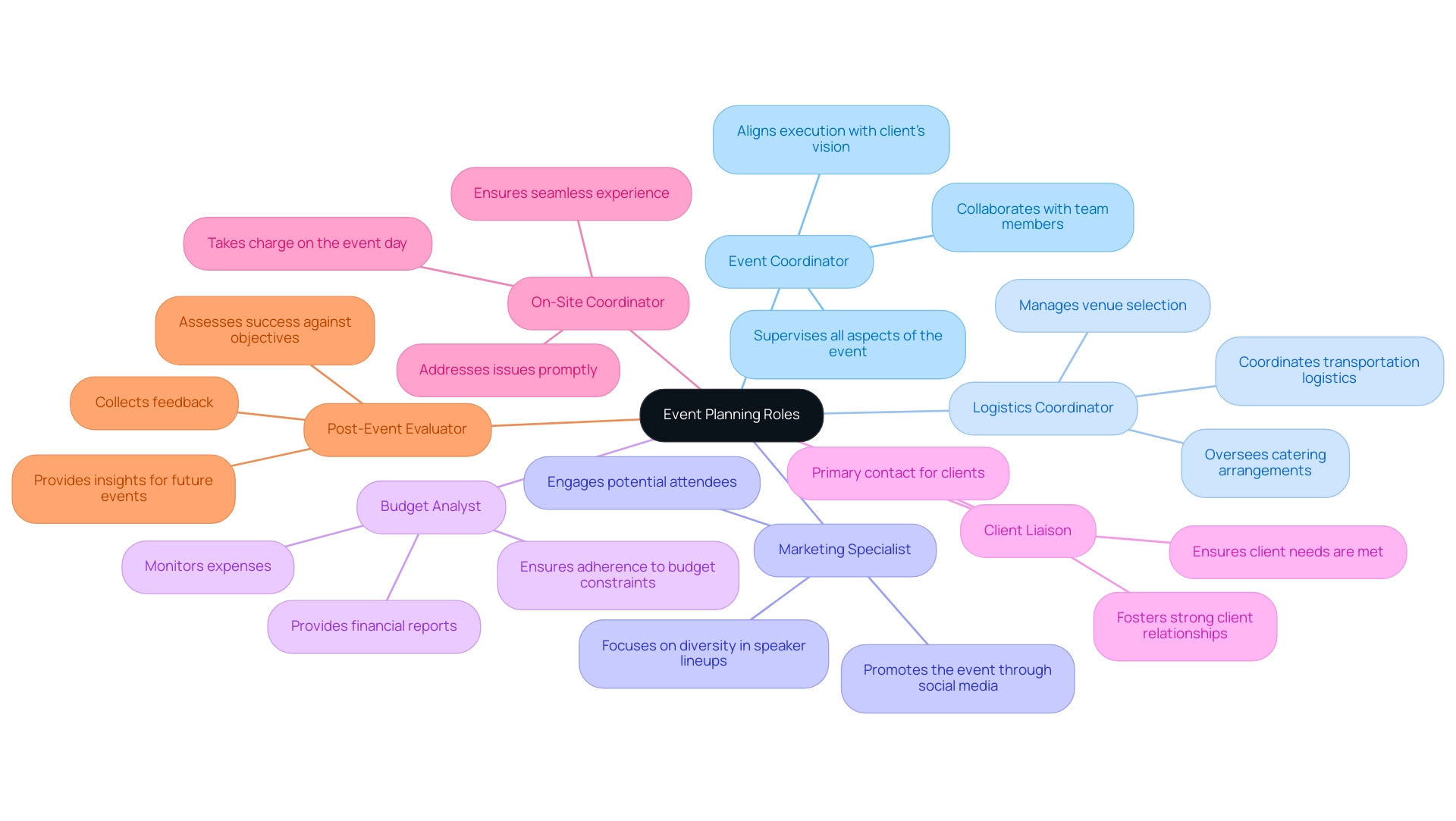
Marketing Your Event Planning Business: Strategies for Success
To effectively market your event planning business in 2025, we understand that navigating the landscape can feel overwhelming. Here are some nurturing strategies to help you thrive:
- Build a Professional Website: A well-crafted website is essential, serving as your digital storefront. It should not only highlight your services, portfolio, and testimonials from customers but also be user-friendly and optimized for search engines to enhance visibility. In today’s competitive environment, a professional website enhances your credibility and is critical for attracting customers. With the average in-person gathering having 240 registrants, a strong online presence can help you reach a larger audience.
- Utilize Social Media: Social media platforms such as Instagram and Facebook are vital for sharing highlights and engaging with potential clients. This year, teams are focusing on inclusivity, with 55% aiming to make their gatherings more accessible. Social media becomes a powerful tool for reaching diverse audiences. As Amarnath M. observes, “While in-person gatherings are back in full force, hybrid formats are continuing to rise,” which emphasizes the need for adaptable marketing approaches in your social media strategy.
- Building relationships through networking is crucial for success in the event planner business. We know that participating in industry gatherings and joining local commerce groups can help you forge connections that lead to referrals. Your business’s success often hinges on personal relationships and community involvement, so don’t hesitate to reach out.
- Content Marketing: Creating valuable material such as blogs or videos that offer advice and insights into occasions can establish you as a sector authority. This strategy for your event planner business not only attracts potential clients but also builds trust and authority in your niche. You have the power to share your knowledge and connect with others.
- Email Marketing: Building an email list and distributing regular newsletters containing updates, promotions, and useful planning tips keeps your audience engaged. Consistent communication strengthens your brand and promotes repeat transactions. Remember, you are not alone in this journey; your audience is eager to hear from you.
- Collaborate with Vendors: Form partnerships with local vendors and venues to cross-promote services. This collaboration can broaden your reach, presenting your business to new customers while improving the experience through reliable local resources. Together, you can create memorable events.
- Offer Free Workshops: Conducting workshops or webinars on pertinent subject matter can demonstrate your expertise and attract potential clients. This not only positions you as a knowledgeable resource but also nurtures a sense of community, encouraging attendees to consider your services for their future gatherings.
Furthermore, as emphasized in the case analysis on technology adoption in gatherings, 65% of organizers are incorporating technologies such as onsite check-in tools, QR codes, and artificial intelligence to enhance experiences. Embracing these technologies can improve operational efficiency and maximize opportunities in your marketing strategies. Remember, by adapting to new tools, you are taking a significant step toward a successful future.
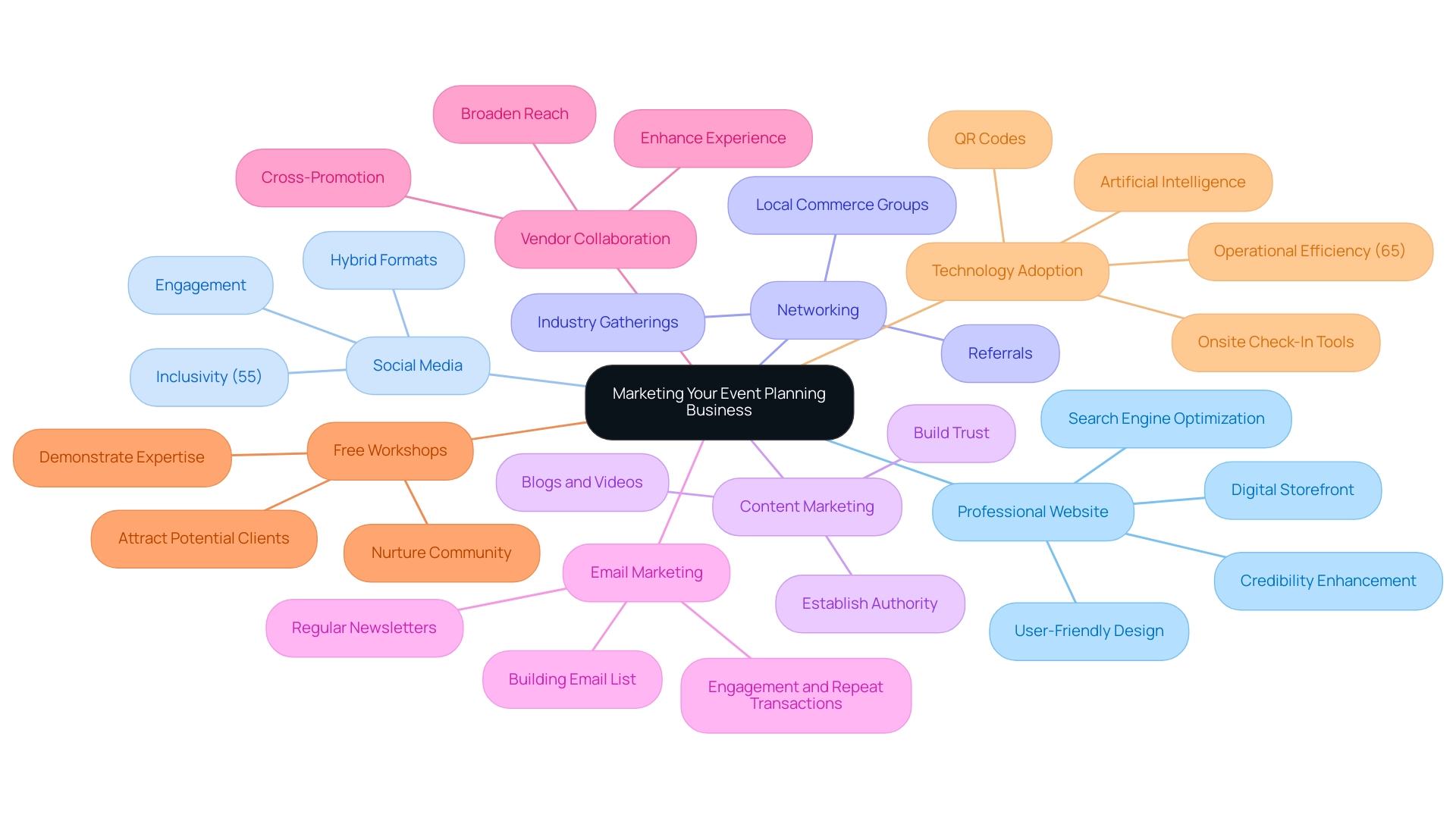
Building Connections: Networking in the Event Planning Industry
Navigating networking within the event planning industry can feel daunting, but you are not alone in this journey. Many professionals share similar challenges, and together we can explore essential strategies to enhance your connections and career.
- Attend Industry Events: Engaging in trade shows, conferences, and local networking gatherings is crucial for connecting with fellow professionals and potential clients. These gatherings are vital, with around 89% of businesses acknowledging their significance in achieving key objectives. Have you ever felt the excitement of meeting someone who truly understands your passion?
- Join Professional Associations: Membership in organizations like the International Live Events Association (ILEA) can unlock valuable resources and numerous networking opportunities. These associations provide a platform for collaboration and support within the industry, creating a sense of community that can be incredibly uplifting.
- Leverage Social Media: Utilize platforms like LinkedIn to foster connections with industry professionals. Sharing insights and participating in discussions can enhance your visibility and establish your expertise within the community. Remember, your voice matters, and it can resonate with others looking for guidance.
- Volunteer for Activities: Offering your services pro bono at local gatherings not only builds your experience but also introduces you to other industry professionals. This hands-on approach can lead to meaningful relationships and potential future collaborations. Think of the joy that comes from giving back while building your network.
- Follow Up: After meeting someone, it’s important to send a follow-up message expressing gratitude for the conversation. This simple gesture helps to maintain the connection and keeps you top of mind for future opportunities. A little kindness goes a long way in nurturing these relationships.
- Create a Networking Plan: Establish specific networking goals, such as attending a designated number of gatherings each month or reaching out to a certain number of new contacts weekly. A structured plan will help you stay committed and organized in your networking efforts, making the process feel less overwhelming.
- Be Genuine: Focus on cultivating authentic relationships instead of merely transactional connections. Show a sincere interest in others and their work, as this fosters trust and encourages collaboration in the long run. As David Ogilvy famously said, > The customer is not a moron. She is your wife <— a reminder that genuine connections are rooted in respect and understanding.
- Understand Market Challenges: Be aware that inflation affects over 65% of organizers, leading to increased costs. This context can inform your networking conversations and strategies, allowing you to connect with others facing similar challenges. You are not alone in navigating these difficult waters.
- Measure Your Success: Incorporate data-driven approaches to assess the effectiveness of your networking strategies. The case study titled ‘The Importance of Data in ROI’ emphasizes that measuring success of the gathering is critical. By tracking key metrics, you can optimize your networking efforts and enhance future outcomes.
By applying these strategies, you can significantly improve your networking abilities, ultimately resulting in a more successful and rewarding career. The structured approach advocated by The Entrepreneur’s Source reinforces the importance of clarity and confidence in navigating these networking opportunities. Remember, every step you take brings you closer to your aspirations.
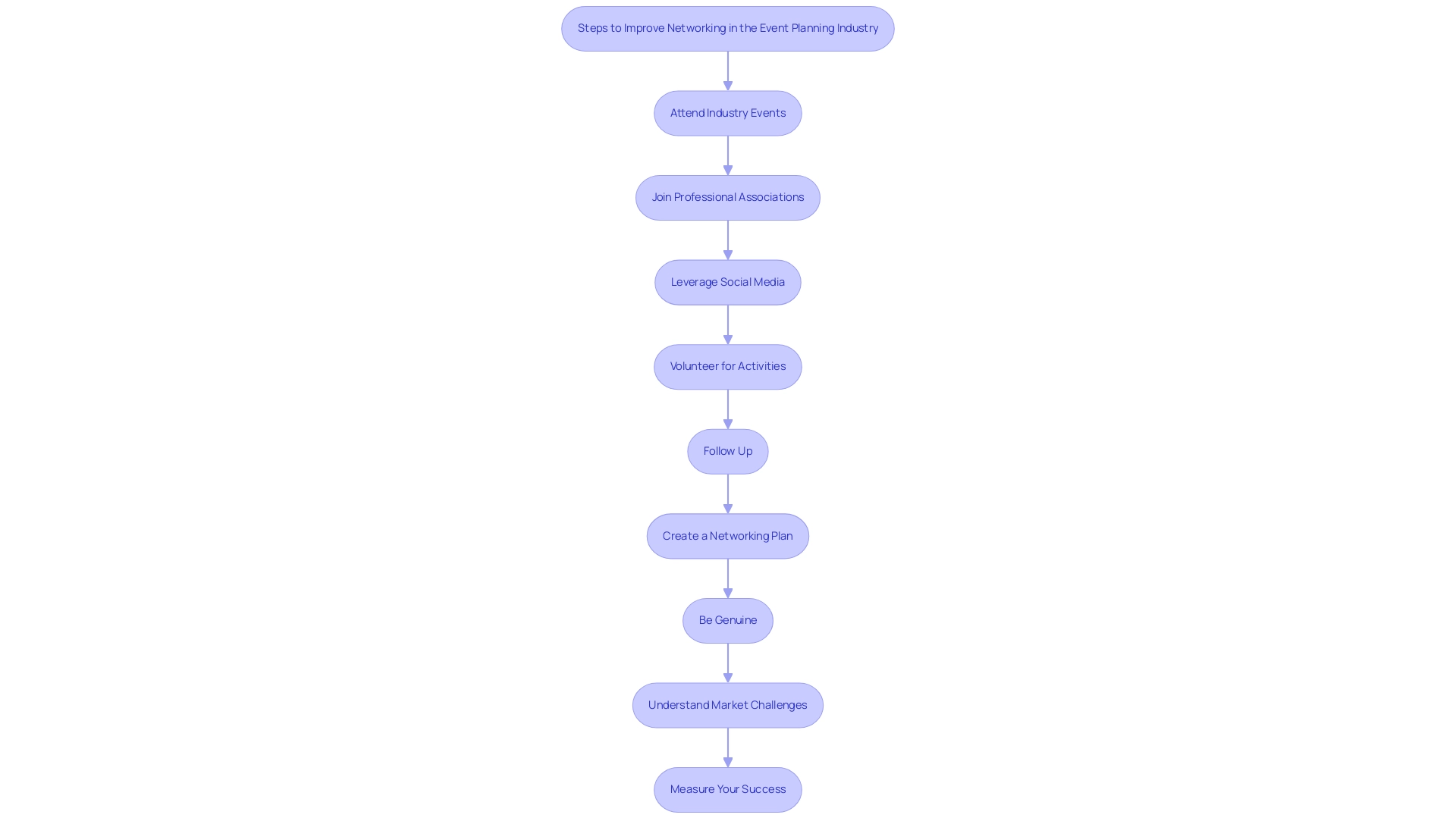
Financial Planning: Budgeting and Pricing Your Event Services
Effectively managing finances is essential for the success of your organization. We understand that navigating financial responsibilities can feel overwhelming, but with a solid foundation, you can thrive. Here are essential steps to help you build that foundation:
- Create a Detailed Budget: Begin by outlining all potential expenses, including venue rental, catering, marketing, and staffing costs. Utilizing budgeting software can streamline tracking and provide clarity on your financial state.
- Determine Your Pricing Structure: Establish whether you will charge clients hourly, per event, or a flat fee. Researching industry standards will help you set competitive yet profitable pricing, giving you confidence in your offerings.
- Include Contingency Funds: Allocate a percentage of your budget for unexpected expenses. This proactive approach ensures you can handle surprises that may arise during the planning process, reducing stress and uncertainty.
- Monitor Cash Flow: Regularly track your income and expenses to remain within budget and ensure profitability. This vigilance is vital for maintaining a healthy financial outlook, allowing you to focus on your passion for event planning.
- Evaluate Your Pricing Regularly: As your business evolves and you gain more experience, reassess your pricing to reflect your enhanced value and the quality of your services. You deserve to be compensated fairly for your hard work.
- Offer Packages: Consider creating bundled service packages at a discounted rate. This strategy can appeal to clients seeking comprehensive solutions and enhance your overall service appeal, making your offerings more attractive.
- Seek Professional Advice: If necessary, consult with a financial advisor or accountant to ensure your financial strategy is robust and compliant with relevant regulations. Their expertise can provide invaluable insights as you navigate the complexities of running a business.
Alongside these strategies, reflect on the influence of using IoT data for equipment monitoring and supply chain visibility, which can improve your operational efficiency in organizing. Moreover, budgeting plays a crucial role in the success of occasion organization, particularly in a market where the number of Party & Occasion Coordinators has experienced an average decrease of 11.6% yearly from 2019 to 2024. As noted, “This approach reduced production costs per vehicle by 30% between 2020 and 2024 and increased production efficiency by 40%.”
By mastering these financial strategies, you position yourself to thrive in the competitive landscape of the event planner business. Remember, you are not alone in this journey. Additionally, leveraging resources from The Entrepreneur’s Source, such as personalized coaching and educational materials, can provide valuable support as you transition into this field.
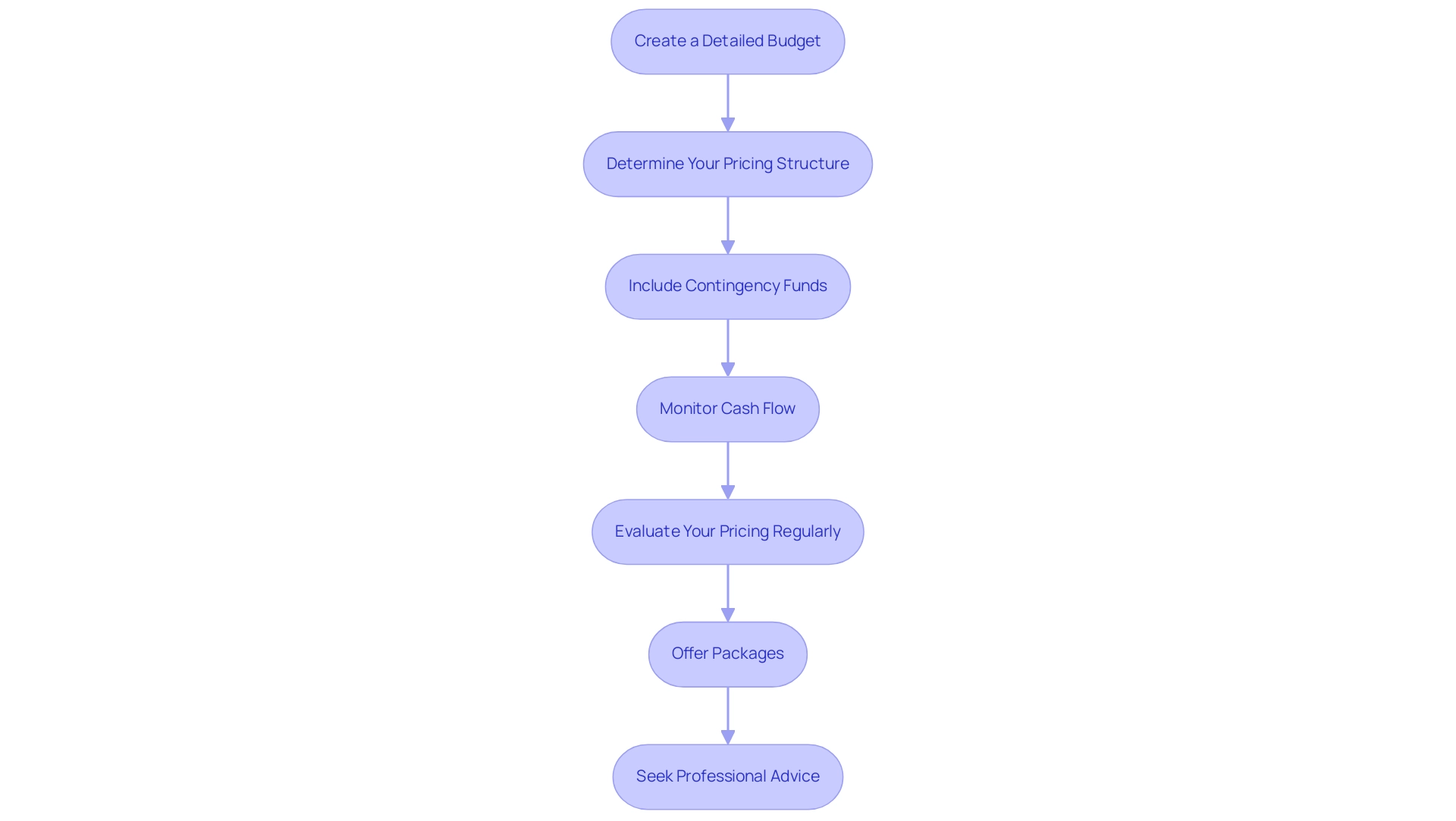
Conclusion
As we look toward establishing a successful event planning business in 2025, it’s essential to recognize the challenges that lie ahead. Understanding industry dynamics, emerging trends, and essential skills can feel overwhelming, but you are not alone in this journey. By exploring market trends, identifying your target audience, and analyzing competitors, you can build a strong foundation for your venture, paving the way for success.
Effective job descriptions and clearly defined roles are crucial in attracting the right talent and ensuring your team operates smoothly. We understand that equipping yourself with vital skills—like organizational prowess, effective communication, creativity, and budget management—can enhance your chances of success. These are not just skills; they are the tools that will empower you to thrive in a competitive landscape.
Networking and innovative marketing strategies can also help you stand out. In this ever-evolving industry, embracing technology and sustainable practices will resonate with diverse audiences, leading to memorable and impactful events. Remember, fostering connections and thinking outside the box can make a significant difference in your journey.
The path to success in event planning is multifaceted, emphasizing adaptability and continuous learning. By focusing on these critical components, you can navigate the challenges of the industry with confidence. Your vision can become a reality, contributing to the evolution of event experiences. With dedication and strategic planning, the potential to create extraordinary events that leave lasting impressions is well within your reach. Take that first step toward your dreams—you have the power to make it happen.


